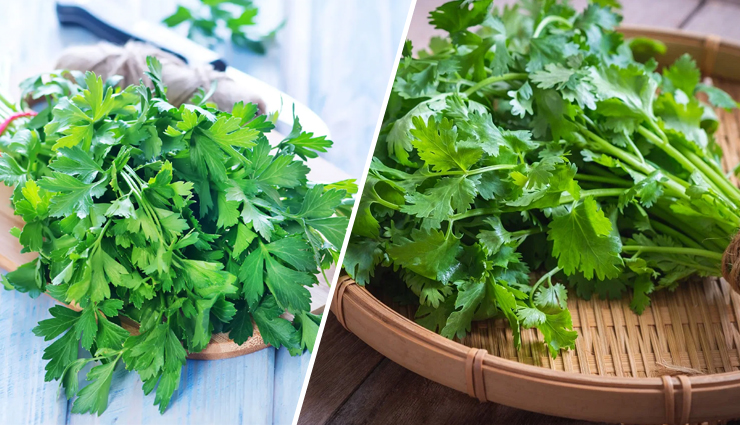- Home›
- Healthy Living›
- Which Is Better To Eat For Health- Parsley Or Coriander?
Which Is Better To Eat For Health- Parsley Or Coriander?
By: Priyanka Maheshwari Sat, 03 Aug 2024 7:38:33

Parsley
Parsley is a vibrant green herb that is commonly used as a garnish or in culinary dishes. Beyond its culinary uses, parsley is a powerhouse of nutrients. It is particularly rich in vitamins A, C, and K, as well as folate and iron. Parsley is known for its antioxidant and anti-inflammatory properties, which can help combat oxidative stress and reduce inflammation. It also supports kidney health by aiding in detoxification and may improve digestion due to its fiber content. Additionally, parsley has been linked to improved bone health due to its high vitamin K content.
Coriander (Cilantro)
Coriander, also known as cilantro in its leaf form, is another herb celebrated for its health benefits. It contains a wealth of nutrients, including vitamins A, C, and K, as well as essential minerals like potassium, calcium, and magnesium. Coriander is renowned for its antioxidant properties, which help neutralize free radicals and reduce oxidative stress. It may also aid in digestion, help manage blood sugar levels, and support heart health. The seeds of the coriander plant, known as coriander seeds, have their own set of benefits, including anti-inflammatory and digestive health properties.
Incorporating both parsley and coriander into your diet can provide a range of vitamins, minerals, and antioxidants, contributing to overall health and well-being.
Parsley and coriander offer a variety of health benefits:

Parsley
- Rich in Nutrients: Parsley is a great source of vitamins A, C, and K, as well as folate and iron. These nutrients contribute to overall health and well-being.
- Antioxidant Properties: It contains antioxidants like flavonoids and vitamin C that help combat oxidative stress and reduce inflammation in the body.
- Supports Digestion: Parsley can aid in digestion due to its fiber content, which helps regulate bowel movements and promotes gut health.
- Promotes Kidney Health: Parsley has diuretic properties that support kidney function and help in detoxifying the body.
- Bone Health: The high vitamin K content in parsley supports bone health by aiding in calcium absorption and bone mineralization.
- Immune Support: The vitamin C in parsley boosts the immune system, helping the body fight off infections.

Coriander (Cilantro)
- Nutrient-Rich: Coriander is packed with vitamins A, C, and K, as well as essential minerals like potassium, calcium, and magnesium.
- Antioxidant Benefits: Coriander has antioxidants that help neutralize free radicals and reduce oxidative stress, which can lower the risk of chronic diseases.
- Supports Digestion: It has digestive properties that can help alleviate symptoms like bloating and gas, and improve overall digestive health.
- Blood Sugar Management: Coriander may help manage blood sugar levels, making it beneficial for individuals with diabetes or those looking to maintain stable blood sugar.
- Heart Health: The herb can support heart health by reducing cholesterol levels and improving blood circulation.
- Anti-Inflammatory Effects: Coriander contains compounds that have anti-inflammatory properties, which can help reduce inflammation in the body.
Including both parsley and coriander in your diet can provide these diverse health benefits and contribute to a balanced and nutritious diet.
Here are the approximate nutritional values for 100 grams of parsley and coriander (cilantro). Note that these values can vary slightly based on the source and preparation method.
Parsley (per 100 grams)
Calories: 36 kcal
Protein: 3.0 g
Fat: 0.8 g
Carbohydrates: 6.0 g
Fiber: 3.3 g
Vitamin A: 421 µg (47% of Daily Value)
Vitamin C: 133 mg (148% of Daily Value)
Vitamin K: 1640 µg (1375% of Daily Value)
Folate: 152 µg (38% of Daily Value)
Iron: 6.2 mg (34% of Daily Value)
Calcium: 138 mg (14% of Daily Value)
Potassium: 554 mg (12% of Daily Value)
Coriander (Cilantro) (per 100 grams)
Calories: 23 kcal
Protein: 2.1 g
Fat: 0.5 g
Carbohydrates: 3.7 g
Fiber: 2.8 g
Vitamin A: 674 µg (75% of Daily Value)
Vitamin C: 27 mg (30% of Daily Value)
Vitamin K: 310 µg (258% of Daily Value)
Folate: 62 µg (16% of Daily Value)
Iron: 1.8 mg (10% of Daily Value)
Calcium: 67 mg (7% of Daily Value)
Potassium: 521 mg (11% of Daily Value)
Both parsley and coriander (also known as cilantro) are quite healthy and offer different benefits:
- Parsley is rich in vitamins A, C, and K, and is a good source of antioxidants. It's known for its potential to support kidney health, improve digestion, and provide anti-inflammatory effects.
- Coriander contains vitamins A, C, and K, along with potassium, calcium, and magnesium. It has antioxidant properties and may help with digestion, manage blood sugar levels, and support heart health.
Including both in your diet can offer a variety of nutrients and health benefits.





